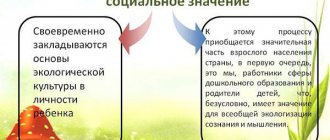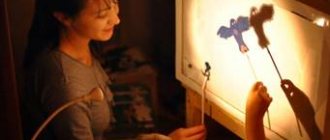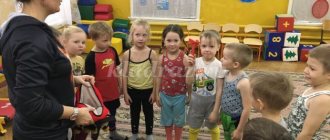Training for teachers “Formula of a good mood”
Training for teachers
"Formula for a good mood"
Training objectives:
- Mastering ways to relieve emotional stress and ways to prevent it;
- Forming an understanding of the need to preserve health;
- Activation of the process of self-knowledge and mutual knowledge among teachers;
- Creating conditions for group cohesion;
- Formation of adequate self-esteem of professional qualities and level of aspirations;
Training objectives:
- Consider and test options for relieving emotional stress;
- Creating a favorable emotional mood that promotes unity among the teaching staff;
- Encourage participants to analyze their personal and professional activities;
- To develop the skills of objective assessment of real and desired relationships in the family and at work;
Equipment
: music for relaxation, Whatman paper (“Mood Calendar”), markers, colored pencils, standard sheets of paper, handouts.
Introduction.
Relevance of the chosen topic.
Leading.
The profession of a teacher requires great endurance and self-control.
From numerous intense contacts with students and parents, the teacher experiences great neuropsychic stress, which manifests itself in emotional exhaustion. Often teachers are in situations of extreme emotional stress. According to my observations, sometimes you experience this emotional stress not at the end of the year, but already at the beginning, of course this is due to the specifics of working with the contingent with whom we work.
One wise man said: “It’s better to say it once and do it yourself than to hear about it a hundred times.” And I wanted you to start work in a good mood. I will try to help restore your strength and remind you of the importance of preserving health in our professional activities. Let's try, using special methods, to activate the internal resources of the individual. Maybe look at each other from a different side that was unknown to you and just relax and unwind a little.
It is no secret that not all of you view the interaction between a teacher and a psychologist with optimism. Therefore, I chose the poem “Free Conversation” as the epigraph for our meeting today:
| – Shall we talk? - About what? - About various things and other things. About what is good and not very good. You know a lot. But I know something. Shall we talk? - Let's talk. Suddenly it will be interesting. |
Main part
Exercise No. 1 “Mood calendar.”
Purpose: diagnosing the mood of the participants.
Carrying out: a mood calendar is created. All the names of the participants are written on the board. Participants are offered pictures (a sun – a good mood, a cloud – a bad mood, and a cloud with the sun – a not very good mood). The participant chooses the picture that best suits his mood and attaches it next to his name. At the end of the session, the mood of the participants is also monitored.
Every group has rules by which it operates or adheres. And I propose a number of specific rules, you can also propose your own rules, which we will adhere to. Rules are norms that significantly reduce wasted time, allow you to work productively on yourself and help achieve the main goal of the lesson.
Rules for group work.
- Address each other by name.
- Accept yourself and others as they are.
- Be sincere.
- Avoid judging each other.
- Active participation in what is happening.
- Respect for the speaker.
- Each group member has at least one good and kind word.
- Confidentiality of everything that happens in the group.
- Communication based on the “here and now” principle.
Exercise No. 2 “Name and epithet.”
The group sits in a circle and each one introduces himself to the others in turn, saying his name and epithet. This adjective should begin with the same letter as the name, positively characterize the person and, if possible, contain exaggeration (genius Gena). The participant must first repeat the name and epithet of the previous speaker, then name his combination.
Issues for discussion:
- What epithets impressed me?
- What names did I have trouble remembering?
- Who am I interested in now?
Exercise No. 3 “Ordinal counting”.
Goal: Establish eye contact with all participants. Everyone sits in a circle, one person says “one” and look at any participant in the game, the one he looked at says “two” and looks at the other.
Exercise No. 4 “Cornice”.
Goal: strengthening goodwill, openness and mutual assistance in the group.
Teachers stand one after another, touching their shoulders and focusing on a line on the floor. Psychologist: “This feature is the cornice of a high-rise building. The toes of your shoes are the edge of this cornice. One person from the group, if desired, must walk along the ledge and not fall down. The group's task is to help him with this. Support in the form of physical contacts and brief conversations are allowed. The main thing is to walk along the cornice!”
Then the participant who “walked along the cornice” shares his impressions: on what part of the path he felt supported, where it was difficult for him to cope with the game task and why. Group members also exchange views on why support was successful in some cases and not in others. If a player “falls”, this is also discussed in the group.
Exercise No. 5 “Washing machine”.
Goal: relieving excess tension.
All participants stand in two lines facing each other. The first person is the “machine”, the last person is the “dryer”. The car passes between the ranks, everyone washes it, strokes it, rubs it carefully and carefully. The dryer should “dry” it – hug it. The one who has passed the “wash” becomes a dryer, and the next car comes from the beginning of the line.
Issues for discussion:
- How did you feel when you went through the “wash”?
- Whose touch was more pleasant to you?
Exercise No. 6 “Balance is real and desirable.”
Goal: discussion and objective analysis of the real and desired balance of personal and professional life of teachers.
Material:
paper, pen or pencils.
It is proposed to draw 2 circles, in the 1st, focusing on internal psychological sensations, using sectors to mark the current relationship between work (professional life), housework and personal life (travel, leisure, hobbies).
In the other circle is their ideal ratio.
Are there any differences? What are they? Why did this happen?
What can be done to bring one closer to the other? Due to what?
On whom or what does it depend?
Exercise No. 7 “Screen test”.
Goal: developing a sense of self-worth.
- Make a list of 5 things in your life that you are proud of.
- Select one accomplishment from your list that you are most proud of.
- Stand up and tell everyone: “I don’t want to brag, but...” and follow up with words about your achievement.
Issues for discussion:
- How did you feel sharing your achievements?
- Do you think others experienced the same thing as you when you performed? Why?
Exercise No. 8 “Good catcher”.
Goal: to develop the skills of a positive attitude towards life situations.
Instructions (Quiet instrumental music plays.)
Whatever happens to you, try to find the positive sides in everything. Let's practice. Please find and write down positive moments in the following situations:
- You are getting ready for work, the weather greets you with pouring rain.
- You are late for work, you run to the bus stop, and the bus leaves in front of “your nose.”
- You don't have money to go on vacation somewhere.
- A friend did not congratulate you on the holiday.
- Your child got into a fight at school.
Comments for the presenter.
Participants write their own positive aspects for each situation. Everyone takes turns reciting these points. The participant who points out more than 5 positive aspects in each proposed situation is awarded a medal: “Benefit Catcher”!
Exercise No. 9 “I’m offended when...”.
Participants write a phrase on pieces of paper that begins with the words: “I’m offended when...” and finish the sentence, indicating their offense. Then each participant, in a circle, utters his grievance. Next, participants are asked to pretend to be offended. Each participant in a circle says “my offense is like...” and imitates. The next one continues, saying “(name of the previous participant)’s resentment is like..., and my resentment is like...” and also depicts. Then follow the snowball principle.
It is suggested to crumple up the pieces of paper with the sentences “I was offended when...”, and throw them in the trash with the words “ I don’t need this offense anymore!”
I don’t need this dark thought anymore.”
Exercise – relaxation “Self-developing performances” (music, sound of the sea).
Goal: to develop the ability to switch activities and relieve emotional stress.
Sit comfortably. Close your eyes. Relax. We take a deep breath and exhale. Let's focus on our feelings. Now let’s try to recreate in our imagination a complete picture, a complete image.
Imagine a beach by the sea. Hot day. The sun is beating down. You are in a bathing suit. We stretch out on the sand with pleasure... We look out to sea. The heads of the swimmers are visible... Let's take a closer look at the horizon line. What appeared there? We look closely... And what is happening around, on the shore?
The sun is hot, you have to turn from side to side. I want to swim... We enter the water... We feel its touch... What is it like?
The images go away. Focus your attention on your body. They clenched their hands. We opened our eyes.
Reflection exercise:
Were you able to see the whole picture and evoke the corresponding bodily sensations? What prevented you from relaxing? How to overcome this situation?
Final part.
Exercise No. 10 “Applause” (farewell ritual).
Instructions. Stand in a circle. Hold hands and feel the warmth of your colleagues' hands. May this feeling of warmth remain in your souls for a long time.
The presenter begins to clap her hands and approaches one of the group members. This participant then chooses the next one from the group to whom they both applaud. The third chooses the fourth, etc. The last participant is applauded by the whole group.
“Mood calendar”
(note whether the mood of the teachers changed after the lesson).
Training reflection:
Did the training help you relieve stress and improve your emotional state? Has something changed in your feelings and well-being? What exercises can you do on your own to maintain your mental health? and physical health? In the next classes you would like to become familiar with health and health preservation techniques.





